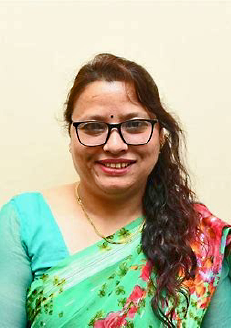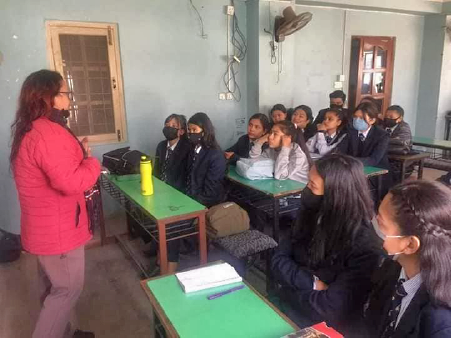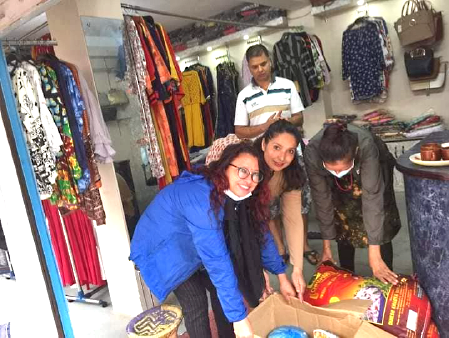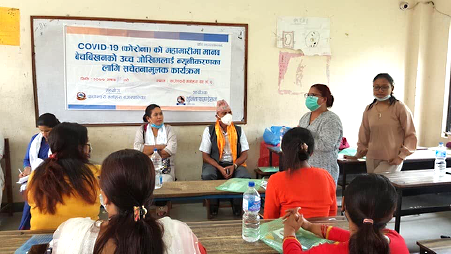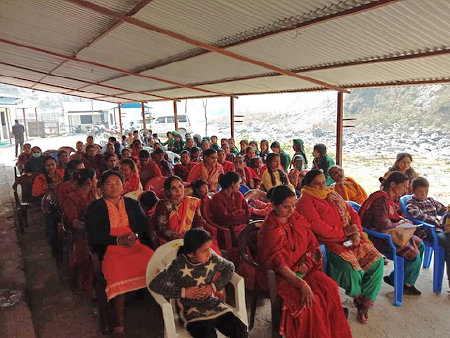Real Life Stories: People Trafficking in Nepal (The Sunita Foundation)
The latest in our series of partner interviews is with Sunita Danuwar. Liluye’s staff writer, Emma Lees, interviewed Sunita to find out more about her organizations work.
This is the Liluye interview of Sunita:
Sunita set up The Sunita Foundation in Kathmandu, Nepal in 2019 to work in several areas towards eradicating human trafficking. Firstly, they promote awareness-raising programmes to try and prevent trafficking from taking place. In addition, they also have a number of other programmes, including rescuing survivors and supporting their rehabilitation. This is complex work which includes providing an open shelter and also employment opportunities in rural agriculture. Finally, they work in advocacy, greater awareness-raising and campaigning at a political level. Sunita herself has also won a number of awards for her work in this field and is considered one of the top 50 leaders in the world of working to combat human trafficking.
How did you first get involved in being part of this work?
Thank you so much. I am involved because I am a survivor of human trafficking.
When I was 14 years old I was trafficked to Mumbai (India) to work in brothels. I spent six months there and I was rescued from the brothels by the police who were undertaking rescue campaigns at the time. Around 500 girls were rescued from the brothels. I feel like a lucky person, I feel like I got a second life. I was very happy at that time and I thought I will do something positive in my society; in my country. Because at that time, girls and women were often trafficked to the brothels and I wanted to stop it. I thought I could rescue them respectfully and work to repair things in our country.
Having said that, human trafficking is a global issue; not just in one country like India or Nepal. I thought I would do anything to fight against human trafficking in the world, so that’s why I’m here.
So you’ve taken your own personal experience and really tried to give other people the same opportunity that you had by being rescued. That’s amazing.
What are the specific mission and goals for The Sunita Foundation?
The Sunita Foundation has been established and is run by trafficking survivors. Our mission and goal is to stop human trafficking in this society, in our country and globally. Nowadays, those who are trafficked are not only sex workers. It also happens for labour/home help, in the name of marriage, and even education. There are all kinds of forms of trafficking. We want to stop this and we also want to develop a more respectful society because in Nepal it is a patriarchal society. Women are so dominated by men. We want to try to create equality.
We also try to dignify the lives of survivors in our society because there are many experiences of survivors whose parents, friends and so on who cannot easily accept them. So we explain to the survivors and those close to them that it is not their fault, but the fault of the trafficker. We try to find a legal answer, too. The trafficker usually gets punished here in Nepal.
Would you say that the awareness of human trafficking is changing or improving?
The situation has improved a little bit due to Covid-19 as borders to China and India are closed. But trafficking is still going on to those and other places. Usually the borders are open and even passports don’t need to be shown, so unfortunately trafficking is quite easy.
We are working to raise awareness at all levels to try and keep our children safe through networks locally and internationally, too. It is harder for us to do our work right now as schools are closed due to Covid-19 which means we can’t go and talk with students at schools and colleges. Teenage girls and boys are in the high risk group for trafficking so we try to work with them and hopefully we can return to that after this lockdown finishes.
We also work to promote youth economic empowerment. We train them and provide job opportunities whilst also encouraging a modern agricultural sector. Nepal is a beautiful country with lots of land, but young people tend to look to other countries for employment, which also puts them at risk. We are trying to motivate them to stay here and provide alternative jobs and opportunities for them. They will then be less vulnerable to the “opportunities” that might be presented to them that could result in being trafficked.
Do you think that human trafficking can be eradicated?
Currently the entertainment industry, hotels, etc are closed in Nepal and India, but trafficking is still taking place. We are trying to work at a political level to change the laws for those that are trafficked and to deal with those that get trafficked. We want our government to ratify the UN protocol on trafficking (ratified November 2000). If the government signs it, this will support survivors and punish the traffickers.
Recently you, in partnership with Liluye and Victor Lyons from Sessionwise, took part in their PTSD training. Could you explain a bit to us about your experience with this training and how you think you’ll be using it with The Sunita Foundation’s work?
Yes, it was a wonderful opportunity for us and our work. This training is very important for work in this field because we are working directly with survivors. They have many traumas and events they are trying to deal with. This training can quickly help them to work with this trauma and minimise their effects which is so important. I think we need more and more of this kind of training, particularly in Nepal, to raise awareness and provide healing as they [people in Nepal] can be so narrow-minded. We could also provide this support not only to trafficking survivors, but also to those that have survived domestic violence, sexual harassment, and lots of different people. I encourage more of this training to be made available and more people to take it up. After the training, it was clear to me that it can help people lead their lives more easily; more normally. So thank you again for the opportunity and I would like to see more training for the future, please!
That’s really useful to hear how beneficial it was and how important you see it for your work. It’s certainly the intention to try and roll out the training to as many people as possible so that more people can benefit from it and work directly with those that have experienced trauma.
Yes, it is important to remember that this training is not only for trafficking survivors because it can help everyone; all kinds of people. It is harder for survivors as they have their experiences, plus a kind of stigma to live with, which all adds to the trauma, but I think that everybody needs this training to heal themselves.
For more information please visit: PTSD training or SessionWise.
Is there anything else you would like to add?
I ask everyone to give a hand to help eradicate human trafficking. We can all do something, whether it is a small or large donation, or to get involved and add our voice. There are so many ways to help through providing education, health, emotional support, jobs, training, and legal support. Please join in the campaign to fight against human trafficking in the world.
Great. Thank you so much, and thank you for all that you do in this important work. It’s been fascinating talking with you. We hope the situation improves in Nepal very soon, so you can get back to connecting with the people in the communities that you work with.
Thank you so much.
Where to send funding for your work?
To fund the work of The Sunita Foundation, please email them directly: sunitafoundation.nepal@gmail.com.
To find out more about The Sunita Foundation:
Visit The Sunita Foundation on Facebook: Sunita Foundation
For more information about Victor Lyon’s PSTD training (SessionWise), or to support his international training program, please visit: SessionWise.org.
For more information about Liluye or to inquire about becoming a partner, please visit www.liluye.org/contact. Or, if you are interested in donating to Liluye, please visit: www.liluye.org/donate.
Sunita was interviewed by Liluye Staff Writer, Emma Lees, who also writes on her blog, InnerExpat.

